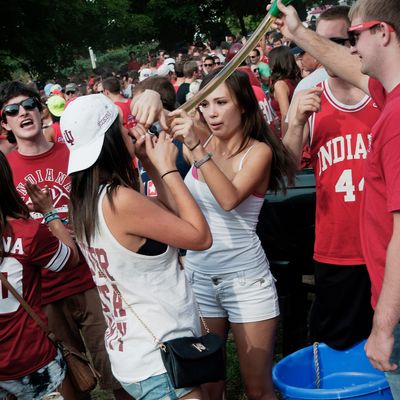
Whatever happened in that discredited Rolling Stone story, whether the proportion of female students victimized by campus sexual assault is 0.6 percent or 20 percent, even if crime rates are falling, far too many women and men face incidences of sexual harassment and abuse in a given year. But economists have one little-discussed way to help drive down rates of abuse: raise taxes.
The taxes in question are alcohol taxes. They are a surprisingly powerful tool to stem alcohol abuse and binge drinking. And they have tremendous knock-on effects on crime rates.
Social scientists and public-policy types have long recognized the deep linkages between alcohol use and crime on college campuses. According to government research, every year, 97,000 students are “victims of alcohol-related sexual assault or date rape,” with alcohol consumption having a profound effect on perpetrators’ behavior. Alcohol reduces inhibition and attention to social cues, and increases aggression. Individuals also use it to justify and abet assault, or to muddy a victim’s memory of and manipulate his or her feelings about the act in question.
Drinking also makes victims more vulnerable to abuse. One study, for instance, found that three quarters of rapes happened “when the victims were so intoxicated they were unable to consent or refuse.” As such, “a woman’s chance of being raped is far more pronounced on campuses where the student body as a whole engages in a high rate of binge drinking and when individuals consume a large amount of alcohol,” said Meichun Mohler-Kuo of the Harvard School of Public Health, the study’s lead author.
It follows that reducing drinking has a positive effect on a variety of health and public-safety outcomes — everything from vehicle crashes to liver cirrhosis to suicide to assault to child abuse to homicide to the transmission of gonorrhea.
So how to get college kids to cut back on the booze? Hew to the fundamental law of economics and raise its price. Study after study has shown that “higher prices or taxes were associated with a lower prevalence of youth drinking.” That includes a reduction in “heavy drinking” and “binge drinking.”
And further studies have linked high prices for beer to lower chances of young individuals “taking advantage of another person sexually or having been taken advantage of sexually,” underscoring that there is a causal mechanism at work. Cheap alcohol means more alcohol means worse behavior means more violence. Expensive alcohol means less alcohol means better behavior means less violence.
Upping the price is the easy part. Impose higher taxes on alcoholic beverages. Add extra levies on the purchase of large amounts of alcohol, like kegs or handles. Slap fees on liquor stores that are located near college campuses. Ban the sale of alcohol near schools. Colleges and universities themselves could also try to influence the price of drinking — charging sororities, fraternities, and social organizations for throwing parties, say, or barring them from offering alcohol for free. A college rager with a cash bar asking $5 a Solo cup is no college rager at all, hard though that rule might be to enforce.
There’s a fun thing that economists and public-policy types think might cut back on alcohol-fueled violence, too: the decriminalization or legalization of marijuana. The studies are a little thinner and shakier here. Nevertheless, there is some evidence that young people tend to substitute pot for alcohol. They either burn one down or chug one down; more pot means less beer. And there’s also evidence that increasing the price of beer nudges young people to switch to pot — with some significant effects, including lower rates of violent crime. “Alcohol is clearly the drug with the most evidence to support a direct intoxication-violence relationship,” according to one paper in the journal Addictive Behaviors. “Cannabis reduces likelihood of violence during intoxication.”
There you have it: Tax the frat boys for their beer and booze, lower the price of pot, and make campuses a far safer place.





























